10 reasons why 2016 was a great year for Buzzards Bay
2016 sure has been a challenging year on the national and global level. But here at home on Buzzards Bay, it was an exceptional year of progress. Thanks to the support of generous donors, loyal members, active Town Meeting voters, and dedicated volunteers, the Buzzards Bay Coalition made important ground in all areas of our work on behalf of the region’s people, land, and waters.
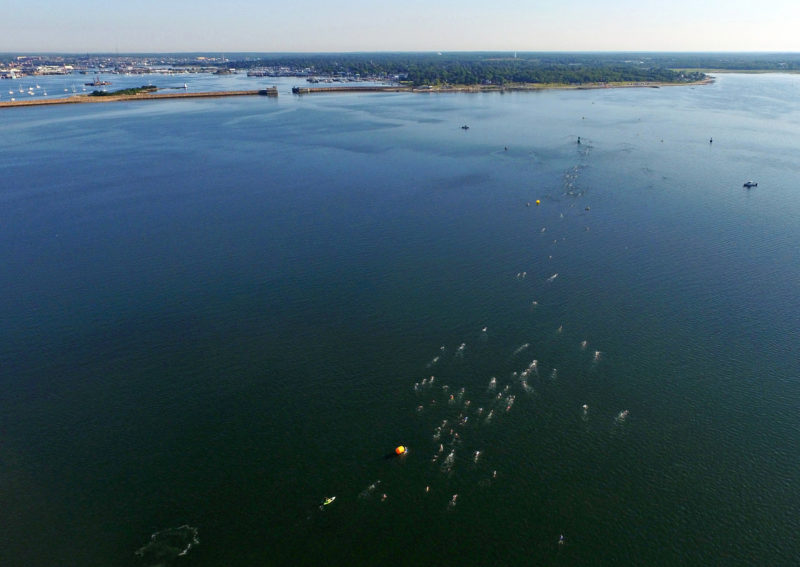
From encouraging news about nitrogen pollution in the latest State of Buzzards Bay report to the largest fundraising events we’ve ever held, 2016 was a fantastic year of progress in our work to Save Buzzards Bay.
There’s no secret to how this work gets done. You see us each weeknight at public hearings in your Town Hall; each day at your kid’s schools and in the field collecting data; each weekend out leading explorations on a local trail, marsh, or beach. (In a new twist, if you live in West Falmouth, you also probably saw us in your neighbors’ backyards and driveways coordinating septic system installations.)
And in between all these public appearances, we are listening to landowners about how we can help them preserve their land, writing grant proposals in partnership with town officials to bring clean water funds to our area, and planning our next major restoration project.
This growing volume of activity, occurring in all watershed communities from Little Compton to Woods Hole, is how the Buzzards Bay Coalition is able to accomplish so much each year on behalf of our local environment.
Although so much remains to be done to protect and restore the Bay’s health, here’s a quick roundup of some of 2016’s greatest accomplishments:
1. State of Buzzards Bay documents encouraging pause in nitrogen pollution
We found some promising news for the health of Buzzards Bay in our latest State of Buzzards Bay report, released in August. For the first time in over a decade, harmful nitrogen pollution in Buzzards Bay did not get worse in 2015, reflecting an encouraging pause in the decline of the health of local harbors, coves, and tidal rivers. After falling at a dramatic rate of three points every four years since 2003 – when we released our first State of Buzzards Bay report – the nitrogen pollution score levelled off in 2015.
No factor has continued to suppress Bay health and restoration efforts more than nitrogen pollution. But local efforts to clean up nitrogen pollution from septic systems and sewer plants, as well as to prevent new sources of pollution, may be beginning to slow these declines.
2. Iconic Wickets Island protected; Onset Center plans underway
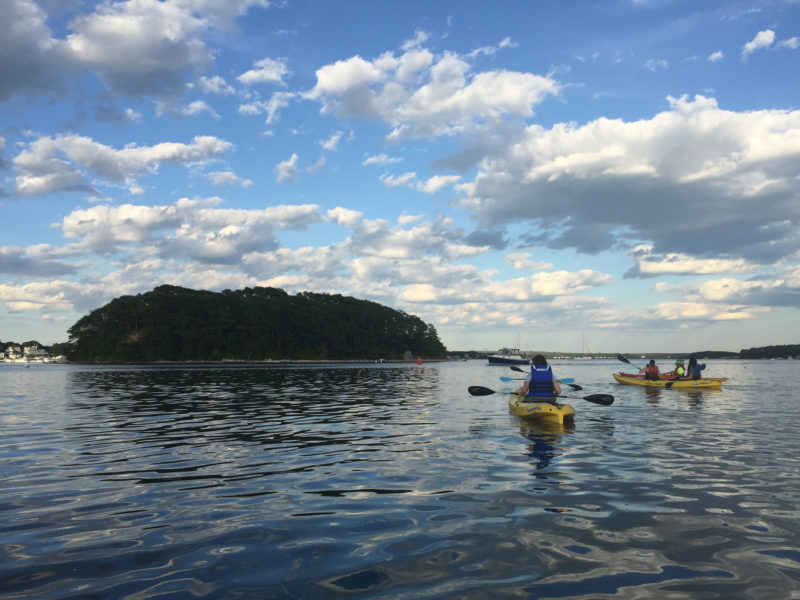
The Buzzards Bay Coalition purchased Wickets Island in 2016, forever protecting this centerpiece of Onset Bay from development.
This year saw several important steps forward in our effort to create a destination on Onset Bay for kids and families in Wareham to connect with the Bay through outdoor exploration.
In June, we completed the purchase of Wickets Island, the centerpiece of Onset Bay, with the support of Wareham Town Meeting voters. And in April, Wareham residents voted unanimously at Town Meeting to award Community Preservation funds to help the Coalition transform the historic Onset Bathhouse into an Onset Bay Discovery Center.
Stay tuned throughout 2017 as we continue to work to complete access improvements to Wickets Island and expand outdoor exploration on Onset Bay for everyone.
3. Launch of Discover Buzzards Bay website, a new portal to outdoor exploration
People take care of things they know and love. Unfortunately, fewer people today know Buzzards Bay’s beaches, salt marshes, and streams. That’s why this year, the Coalition launched Discover Buzzards Bay, a resource to help more people connect with the Bay and its watershed.
The website includes hundreds of events, places, and activities to discover with your friends and family. Whether you’re looking for a new trail to walk, route to cycle, waterway to paddle, or shellfish bed to dig, you can use Discover Buzzards Bay to find an outdoor adventure near you.
But Discover Buzzards Bay is more than just a website – it’s an initiative to get more people outside exploring. So we teamed up with Southcoast Health to promote healthy, active outdoor recreation across the Buzzards Bay region. Over the next two years, we’ll host more of our popular Bay Adventures and grow the Discover Buzzards Bay website to include over 300 places and dozens more activities and adventures to explore.
4. & 5. Clear, fresh water for people to drink and native fish to thrive
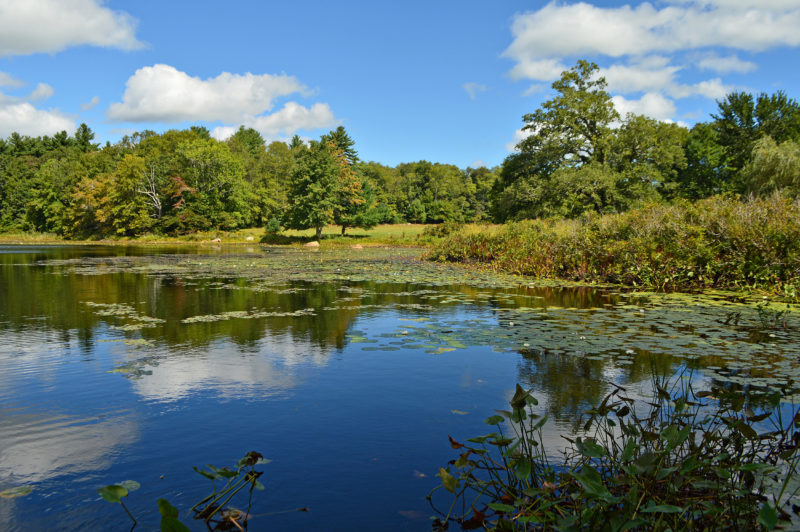
The forests and wetlands along the Mattapoisett River filter clean public drinking water for residents of Fairhaven, Mattapoisett, Marion, and Rochester. They also protect the river’s health.
In the Mattapoisett River Valley, we led an effort to permanently preserve 134 acres owned by the Tinkham family. These forests and wetlands provide the primary filter for the public drinking water supply for Fairhaven, Mattapoisett, Marion, and Rochester residents. They also protect the river’s health and will now be opened to the public for walking and exploration as part of our Mattapoisett River Reserve (including The Bogs and Tripps Mill).
In Westport, we partnered with the Westport Land Conservation Trust to purchase nearly 100 acres on Angeline Brook, a vitally important coldwater tributary to the West Branch of the Westport River. Angeline is distinguished by its own population of native sea-run brook trout – a sign of excellent water quality and biological diversity in the stream.
6. People are making a difference to stop Bay’s biggest source of nitrogen pollution: septic systems
The people of West Falmouth got involved in perhaps the biggest way for clean water in 2016. Twenty homeowners around West Falmouth Harbor took part in a pilot project led by the Coalition and the town of Falmouth to upgrade old septic systems and cesspools – the largest remaining source of nitrogen pollution to the harbor. These new systems are already being shown to reduce an average of 88% of nitrogen compared to the old ones, and a second phase of this effort is already underway.
Now, more homeowners across the region are volunteering to get involved with our work to reduce nitrogen pollution from septic systems. The Coalition is partnering with the Barnstable County Department of Health and Environment and the University of Rhode Island to install 12 septic systems called “layer cakes” at homes in seven towns around Buzzards Bay next year.
7. Growing Acushnet River Reserve gives people a place to walk, fish, paddle, and discover the outdoors
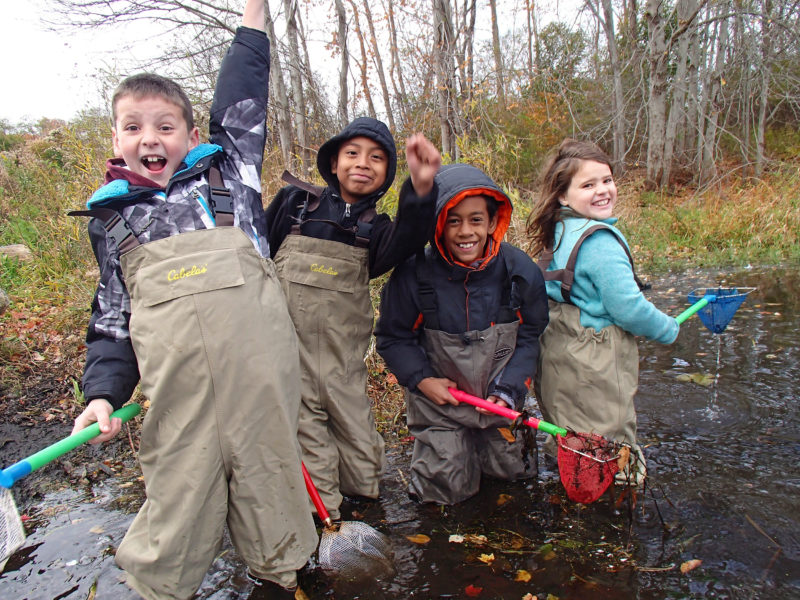
Hundreds of kids from local New Bedford schools explored the Acushnet River at The Sawmill in 2016.
Since the Acushnet Sawmill opened last fall, we’ve been amazed at the number of people who’ve discovered this new park on the Acushnet River. Each week, around 500 people visit The Sawmill to take a walk, go fishing or paddling, snap photographs of wildlife, or simply stand at a river overlook and enjoy the peaceful view.
The Acushnet River Reserve – a network of protected places along the Acushnet River – continues to grow. Just this month, we completed the protection of 9 acres at Hamlin Street, across the river from the historic White’s Factory. The Coalition will own and manage this land, remove an old house and sheds, restore a field, and develop trails and river access – just like at The Sawmill.
8. & 9. Most successful Buzzards Bay Swim and Watershed Ride ever raise $250,000 for clean water
In total, 390 swimmers and cyclists participated in the 23rd annual Buzzards Bay Swim in June and the 10th annual Watershed Ride in October. Together, participants raised nearly $250,000 – the most in the history of these two events. We’re excited that these two great signature outdoor events continue to grow with more people and more funds raised for clean water.
Save the date for next year’s Swim on Saturday, June 24, 2017 and Watershed Ride on Sunday, October 1, 2017.
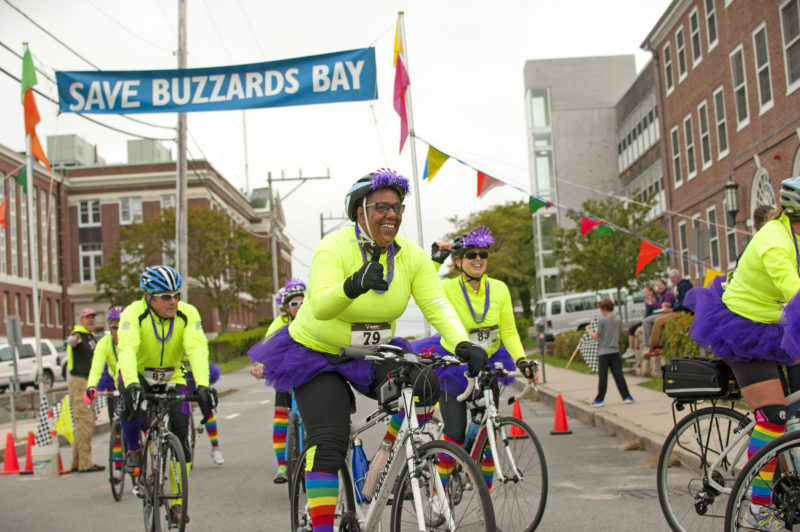
Cyclists in this year’s Buzzards Bay Watershed Ride on Sunday, Oct. 2 raised more than $125,000 — the biggest total in the event’s 10-year history.
10. In 25th year, Baywatchers monitoring expands to Quicksand Pond
This summer, more than 100 volunteers helped complete our 25th season of Baywatchers monitoring. Over the course of the last 25 years, hundreds of people have volunteered to collect critical water quality data that forms the foundation of all our work.
This year, the Baywatchers program expanded for the first time to Rhode Island, where volunteers began sampling at five locations on Quicksand Pond in Little Compton. Quicksand Pond is one of our coastline’s largest salt ponds. The science collected here will both benefit restoration efforts at the pond itself and help inform our understanding of similar ponds across Buzzards Bay.
In 2017, the Coalition will celebrate our 30th anniversary. I hope you’ll join us and help make 2017 our best year yet.